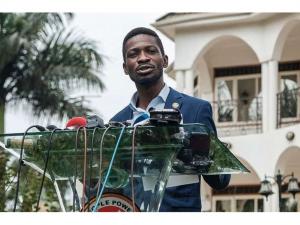
Uganda's Bobi Wine claims poll win as results trickle in
Ugandan opposition leader Bobi Wine on Friday claimed victory in presidential elections, rejecting as a "joke" early results that gave President Yoweri Museveni a wide lead.
The 38-year-old former ragga singer turned politician has been the main rival to 76-year-old Museveni, who has been in power since 1986 and is seeking a sixth term.
The internet remained down for a third day as vote counting continued, with provisional results from 29 percent of polling stations giving Museveni an early lead of 63 percent while Wine trailed with 28 percent.
"I am very confident that we defeated the dictator by far. I call upon all Ugandans to reject the blackmail. We have certainly won the election and we've won it by far," he told journalists.
"The people of Uganda voted massively for change of leadership from a dictatorship to a democratic government. But Mr. Museveni is trying to paint a picture that he is in the lead. What a joke!" said Wine.
He said the election was marred by "illegal, high-handed actions which Museveni and his regime of blood have undertaken to set stage for the worst rigging this country has even witnessed."
He said he would detail the irregularities once the internet was restored.
Earlier an election commission official responded to Wine's accusations of fraud and violence saying: "Let him show the country in what manner, in what form the results are rigged."
On Friday morning the capital Kampala was quiet and some businesses remained closed, while soldiers and police patrolled on foot the day after the election.
Full results are expected by Saturday afternoon.
Museveni is facing a total of 10 candidates, but it is the popularity of the former popstar Wine, who grew up in a slum and is nicknamed the "ghetto president", that has rattled the former rebel leader.
Voting in Kampala took place under the oppressive security presence of soldiers and riot police in the streets and at polling stations.
The poll followed one of the most violent campaigns in years, with harassment and arrests of the opposition, attacks on the media and scores of deaths.
However, election commission chief Simon Mugenyi Byabakama said the vote had gone off in a "peaceful and tranquil manner".
Police spokesman Fred Enanga said there had been "no major cases of violence reported."
A senior foreign diplomat said there had been sporadic incidents of violence and many irregularities but no sign of mass manipulation.
Observers denied
The US, EU, UN and global rights and democracy groups have raised concerns about the integrity and transparency of the election.
Only one foreign organisation, the African Union (AU), has sent monitors, along with an AU women's group.
The United States, a major aid donor to Uganda, cancelled a diplomatic observer mission after too many of its staff were denied permission to monitor the election.
Wine has vowed non-violent street protests should Ugandans feel the election was stolen.
Museveni has warned that using violence to protest the result would amount to "treason".
He has ruled Uganda without pause since seizing control in 1986, when he helped to end years of tyranny under Idi Amin and Milton Obote.
Once hailed for his commitment to good governance, the former rebel leader has crushed any opposition and tweaked the constitution to allow himself to run again and again.
And for many in the country, where the median age is 16, Museveni's glory days are no longer relevant or sufficient.
But Museveni, one of Africa's longest serving leaders, has never lost an election and observers expect this time around will be no different.
His opponents -- most visibly Wine, who spent much of the campaign in a bulletproof vest and combat helmet -- were arrested, blocked from rallying and dispersed with tear gas throughout the campaign.
Two days of protests in November led to the deaths of 54 people.
